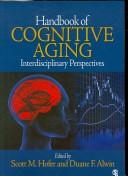| Listing 1 - 5 of 5 |
Sort by
|

ISBN: 1782688633 1412976588 1412941059 1452214956 1441655220 9781441655226 9781412976589 9781452214955 9781412941051 9781412941051 9781412960281 1412960282 9781782688631 Year: 2008 Publisher: Los Angeles : Sage Publications,
Abstract | Keywords | Export | Availability | Bookmark
 Loading...
Loading...Choose an application
- Reference Manager
- EndNote
- RefWorks (Direct export to RefWorks)
This handbook focuses on the multidisciplinary integration of work on cognitive aging, thus bringing together the widest possible range of perspectives. It examines limitations of the extant literature, particularly with respect to research design and measurement, and offers new suggestions to guide future research.
Cognition --- Aging --- Age factors. --- Psychological aspects.
Book
ISBN: 3319715437 3319715445 9783319715438 Year: 2018 Publisher: Cham, Switzerland: Springer,
Abstract | Keywords | Export | Availability | Bookmark
 Loading...
Loading...Choose an application
- Reference Manager
- EndNote
- RefWorks (Direct export to RefWorks)
This volume engages the interface between the development of human lives and social relational networks. It focuses on the integration of two subfields of sociology/social science--the life course and social networks. Research practitioners studying social networks typically focus on social structure or social organization, ignoring the complex lives of the people in those networks. At the same time, life course researchers tend to focus on individual lives without necessarily studying the contexts of social relationships in which lives are embedded and "linked" to one another through social networks. These patterns are changing and this book creates an audience of researchers who will better integrate the two subfields. It covers the role of social networks across the life span, from childhood and adolescence, to midlife, through old age.
Social sciences. --- Computers. --- Developmental psychology. --- Social Sciences. --- Sociology of Family, Youth and Aging. --- Developmental Psychology. --- Information Systems and Communication Service. --- Development (Psychology) --- Developmental psychobiology --- Psychology --- Life cycle, Human --- Automatic computers --- Automatic data processors --- Computer hardware --- Computing machines (Computers) --- Electronic brains --- Electronic calculating-machines --- Electronic computers --- Hardware, Computer --- Computer systems --- Cybernetics --- Machine theory --- Calculators --- Cyberspace --- Behavioral sciences --- Human sciences --- Sciences, Social --- Social science --- Social studies --- Civilization --- Social networks --- Networking, Social --- Networks, Social --- Social networking --- Social support systems --- Support systems, Social --- Interpersonal relations --- Cliques (Sociology) --- Microblogs --- Psychological aspects. --- Information systems. --- Social groups. --- Family. --- Family --- Families --- Family life --- Family relationships --- Family structure --- Relationships, Family --- Structure, Family --- Social institutions --- Birth order --- Domestic relations --- Home --- Households --- Kinship --- Marriage --- Matriarchy --- Parenthood --- Patriarchy --- Association --- Group dynamics --- Groups, Social --- Associations, institutions, etc. --- Social participation --- Social aspects --- Social conditions --- Social networks. --- Social networks - Psychological aspects. --- Interpersonal relations. --- Families.
Book

ISBN: 1283549964 9786613862419 1400845564 9781400845569 069113331X 9780691133317 9780691155906 0691155909 9781283549967 661386241X Year: 2012 Publisher: Princeton, NJ
Abstract | Keywords | Export | Availability | Bookmark
 Loading...
Loading...Choose an application
- Reference Manager
- EndNote
- RefWorks (Direct export to RefWorks)
Social Trends in American Life assembles a team of leading researchers to provide unparalleled insight into how American social attitudes and behaviors have changed since the 1970's. Drawing on the General Social Survey--a social science project that has tracked demographic and attitudinal trends in the United States since 1972--it offers a window into diverse facets of American life, from intergroup relations to political views and orientations, social affiliations, and perceived well-being. Among the book's many important findings are the greater willingness of ordinary Americans to accord rights of free expression to unpopular groups, to endorse formal racial equality, and to accept nontraditional roles for women in the workplace, politics, and the family. Some, but not all, signs indicate that political conservatism has grown, while a few suggest that Republicans and Democrats are more polarized. Some forms of social connectedness such as neighboring have declined, as has confidence in government, while participation in organized religion has softened. Despite rising standards of living, American happiness levels have changed little, though financial and employment insecurity has risen over three decades. Social Trends in American Life provides an invaluable perspective on how Americans view their lives and their society, and on how these views have changed over the last two generations.
Social surveys --- Public opinion --- United States --- Social conditions. --- American South. --- American adults. --- American life. --- American public. --- First Amendment. --- General Social Survey. --- Protestants. --- Republicans. --- Southerners. --- U.S. society. --- adult intelligence. --- behavior. --- blacks. --- conservatism. --- conservatives. --- crime rates. --- education. --- egalitarianism. --- employee well-being. --- equal treatment. --- family income. --- female roles. --- free expression. --- gender roles. --- government programs. --- happiness levels. --- happiness. --- informal social connectedness. --- institutional confidence. --- interpersonal networks. --- job satisfaction. --- job security. --- labor force participation. --- liberals. --- moderates. --- national spending. --- nonconformity. --- organized religion. --- political attitude. --- political conservatism. --- precarious employment. --- public opinion. --- public trust. --- punishment. --- quality of life. --- race. --- racial attitudes. --- racial equality. --- religion. --- religious affiliation. --- religious diversity. --- religious organizations. --- religious rituals. --- social attitudes. --- social networks. --- social order. --- social trends. --- socializing. --- sociopolitical attitudes. --- test performance. --- tolerance. --- unemployment. --- verbal knowledge. --- vocabulary test. --- white Americans.


ISBN: 3110868946 9783110868944 0202305031 020230504X 3110145413 9783110145410 9780202305035 9780202305042 9781351328401 9781351328388 1351328387 Year: 2011 Publisher: Berlin Boston
Abstract | Keywords | Export | Availability | Bookmark
 Loading...
Loading...Choose an application
- Reference Manager
- EndNote
- RefWorks (Direct export to RefWorks)
"The book is the first to grow out of the work of the International Social Justice Project (ISJP), a collaborative study of public opinion about social justice. Though conceived in the year prior to the revolutions that swept central and eastern Europe in 1989, the ISJP did not put its survey into the field until the summer of 1991, in a new climate of open international exchange in social research. Employing common methods of data collection and, within the limits of translation, identical survey instruments, the ISJP investigated public opinion in seven newly emerging post-Communist countries (including the then Czechoslovakia) and five of the world's most influential capitalist democracies, with special sensitivity to divergencies in the newly united Germany." "Among the themes addressed by the volume's contributors are: the views and beliefs of citizens in the post-Communist states on the transition to market economies and parliamentary democracy; the role of ideology in legitimating inequality; the structural determination of beliefs about justice; the processes that shape individual level evaluations; and the major implications of the ISJP findings."--Jacket.
Social justice --- Post-communism. --- Postcommunism --- World politics --- Communism --- Equality --- Justice --- Public opinion. --- Post-communism --- #SBIB:17H20 --- 316.653 --- 316.653 Openbare mening. Publieke opinie --- Openbare mening. Publieke opinie --- Public opinion --- Sociale wijsbegeerte: algemeen --- Political change --- Attitudes --- Political systems --- Welfare state --- Income distribution --- Surveys --- International comparisons --- Overseas item
Book

ISBN: 3110887614 9783110887617 3110143119 3110143127 9783110143119 9783110143126 Year: 2011 Publisher: Berlin Boston
Abstract | Keywords | Export | Availability | Bookmark
 Loading...
Loading...Choose an application
- Reference Manager
- EndNote
- RefWorks (Direct export to RefWorks)
No detailed description available for "Trends and Perspectives in Empirical Social Research".
Social sciences --- Research. --- Science --- Science research --- Scientific research --- Information services --- Learning and scholarship --- Methodology --- Research teams --- Social science research --- Research --- Social sciences - Research.
| Listing 1 - 5 of 5 |
Sort by
|

 Search
Search Feedback
Feedback About UniCat
About UniCat  Help
Help News
News